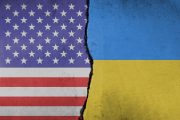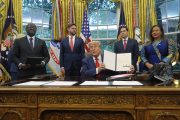On January 3, President Barack Obama signed into law legislation imposing sanctions on Belarus. The Belarus Human Rights and Democracy Act of 2011 was passed by Congress in December in response to a litany of alleged human rights abuses on the part of the former Soviet Republic.
The text of the act enumerates several causes of the congressional effort to punish Belarus:
The Government of Belarus has engaged in a pattern of clear and uncorrected violations of human rights and fundamental freedoms.
The Government of Belarus has engaged in a pattern of clear and uncorrected violations of basic principles of democratic governance, including through a series of fundamentally flawed presidential and parliamentary elections undermining the legitimacy of executive and legislative authority in that country.
The Government of Belarus has subjected thousands of pro-democratic political activists to harassment, beatings, and jailings, particularly as a result of their attempts to peacefully exercise their right to freedom of assembly and association.
The Government of Belarus has attempted to maintain a monopoly over the country’s information space, targeting independent media, including independent journalists, for systematic reprisals and elimination, while suppressing the right to freedom of speech and expression of those dissenting from the dictatorship of Aleksandr Lukashenka, and adopted laws restricting the media, including the Internet, in a manner inconsistent with international human rights agreements.
The Government of Belarus continues a systematic campaign of harassment, repression, and closure of nongovernmental organizations, including independent trade unions and entrepreneurs, and this crackdown has created a climate of fear that inhibits the development of civil society and social solidarity.
The Government of Belarus has subjected leaders and members of select ethnic and religious minorities to harassment, including the imposition of heavy fines and denying permission to meet for religious services, sometimes by selective enforcement of the 2002 Belarus religion law.
The Government of Belarus has attempted to silence dissent by persecuting human rights and pro-democracy activists with threats, firings, expulsions, beatings and other forms of intimidation, and restrictions on freedom of movement and prohibition of international travel.
The indictment extends to the country’s president, Alexander Lukashenko (Romanized spelling, pictured above), labeling him a “dictator” and accusing him of “establish[ing] himself in power by orchestrating an illegal and unconstitutional referendum that enabled him to impose a new constitution, abolishing the duly elected parliament, the 13th Supreme Soviet, installing a largely powerless National Assembly, extending his term in office, and removing applicable term limits.”
As punishment for these offenses against the civil and human rights of the citizens of Belarus, the newly enacted law imposes sanctions which require the United States to investigate Belarus’ arms deals and its possible censorship of the Internet, as well as a refusal to issue travel visas to several Belarusian officials.
One of the more onerous sanctions (likely unintentionally so) instructs the government of the United States to, “continue to work closely with the European Union and other countries and international organizations, to promote the conditions necessary for the integration of Belarus into the European family of democracies….”
Mandating membership in the European Union may be the kiss of death for targeted officials in the small Eastern European nation.
Curiously, there is not a word in the new law indicating where in the Constitution is found authorization for the Congress or President of the United States to compel other nations to join international organizations, particularly ones so dysfunctional as the EU.
A report in Jurist on the President’s signing of the slate of sanctions relates a few of the events that may have precipitated the passing of the bill:
In November a Belarus court convicted human rights activist Ales Bialiatski, the president of Viasana and vice-president of the International Federation for Human Rights (FIDH), of tax evasion, sentencing him to a four-and-a-half-year prison term amid international criticism. In September UN High Commissioner for Human Rights Navi Pillay suggested a need for UN intervention in Belarus and demanded the nation free non-violent political prisoners. Her report also cited Belarus as the only European nation to still enforce the death penalty. Ambassador Mikhail Khvostov said his country disagrees with the UN on what constitutes a peaceful demonstration and that Belarus is committed to human rights.
Despite the strong language of the official rebuke, provisions of the new law establish that it is the intent of the United States “to remain open to reevaluating its policy toward Belarus as warranted by demonstrable progress made by the government of Belarus.”
Regardless of the veracity of the charges leveled by the United States against the government of Belarus, there is something redolent of stones being thrown by those living in glass houses when it comes to Barack Obama branding another president a “dictator.”
There are few more dictatorial acts than the signing of a law granting to oneself the absolute power to deploy armed military units to arrest and indefinitely detain American citizens upon a mere suspicion of being a “military threat” to the security of the homeland. Then, once the suspect is imprisoned, denying him access to an attorney or information related to the crimes with which he is ostensibly being charged. Both provisions are violative of core constitutional liberties.
That sort of power sounds very dictatorial, indeed.
Furthermore, how can a nation that passes laws such as the one described above (the National Defense Authorization Act) appoint itself as the worldwide guardian of self-government and human rights?




